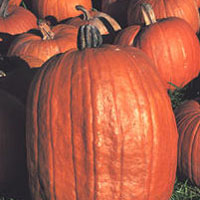
A-Z Indexes Food Health Guides
Health News |
PumpkinFind ProductsAlso indexed as:Cucurbita maxima, Cucurbita pepo  © Martin Wall © Martin WallBotanical names: Cucurbita maxima, Cucurbita pepoParts Used & Where GrownPumpkins and other squashes are native to North and Central America, but have since been cultivated around the world. The seeds are primarily used in herbal medicine. The yellow blossoms of pumpkins are also used as medicine in some native traditions.
Our proprietary “Star-Rating” system was developed to help you easily understand the amount of scientific support behind each supplement in relation to a specific health condition. While there is no way to predict whether a vitamin, mineral, or herb will successfully treat or prevent associated health conditions, our unique ratings tell you how well these supplements are understood by the medical community, and whether studies have found them to be effective for other people. For over a decade, our team has combed through thousands of research articles published in reputable journals. To help you make educated decisions, and to better understand controversial or confusing supplements, our medical experts have digested the science into these three easy-to-follow ratings. We hope this provides you with a helpful resource to make informed decisions towards your health and well-being. This supplement has been used in connection with the following health conditions:
Traditional Use (May Not Be Supported by Scientific Studies)Native Americans used pumpkin flesh and seeds for food. Their use of the seeds for the treatment of intestinal infections eventually led the United States Pharmacopoeia to list pumpkin seeds as an official medicine for parasite elimination from 1863 to 1936.1 Native Americans also commonly used pumpkin seeds to treat a variety of kidney problems. The flowers were used topically to soothe minor injuries.2 Eclectic physicians (doctors who recommended herbal medicine) at the end of the 19th century used pumpkin seeds to treat urinary tract problems and gastritis, and to remove tapeworms and roundworms from the intestines.3 Copyright © 2026 TraceGains, Inc. All rights reserved. Learn more about TraceGains, the company. The information presented by TraceGains is for informational purposes only. It is based on scientific studies (human, animal, or in vitro), clinical experience, or traditional usage as cited in each article. The results reported may not necessarily occur in all individuals. Self-treatment is not recommended for life-threatening conditions that require medical treatment under a doctor's care. For many of the conditions discussed, treatment with prescription or over the counter medication is also available. Consult your doctor, practitioner, and/or pharmacist for any health problem and before using any supplements or before making any changes in prescribed medications. Information expires December 2026. |
